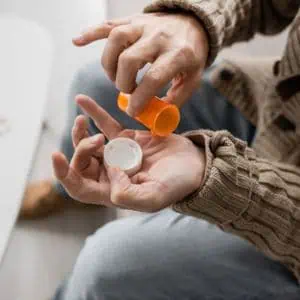What is Genital Herpes?
Genital herpes is a sexually transmitted disease caused by two types of viruses. The viruses are called herpes simplex virus type 1 (HSV-1) and herpes simplex virus type 2 (HSV-2), one of several sexually transmitted diseases. The most outward sign of a herpes infection is the red blisters that form on the genital area during a breakout. The blisters will appear at the site on your body where you made contact with the virus on an infected person.
Your body’s natural immune response causes blisters or sores as it fights the infection. In addition to the genitals, lips, and anus, they may also affect the fingers, tongue, gums, eyes, and nipples.

How is the Herpes Virus Transmitted?
Genital herpes is usually transmitted through direct contact with active blisters or open sores, most often during sexual contact with an infected sex partner. However, it also can be spread even if sores are not visible or present. The virus can pass through broken skin or the thin membranes of the genitals, urinary orifice, anus, or cervix.
Herpes can be passed from one part of the body to another, such as from the mouth to the genitals during oral sex. Oral herpes is usually caused by HSV-1 and can result in cold sores or fever blisters on or around the mouth. However, most people do not have any symptoms. An infected person may also infect another part of his/her own body if he/she touches the sore and then touches another moist or vulnerable area of the body. Genital herpes is usually spread by having vaginal, oral, or anal sex.
You will not get herpes from toilet seats, bedding, swimming pools, or touching objects around you such as silverware, soap, or towels. If you have additional questions about how herpes is spread, consider discussing your concerns with a healthcare provider.
Symptoms of Genital Herpes
Most people who have genital herpes have no symptoms or have very mild symptoms. You may not notice mild symptoms, or you may mistake them for another skin condition, such as a pimple or ingrown hair. This is why herpes is easy to transmit and why it is one of the most common sexually transmitted infections.
Symptoms may appear anywhere from 2 days to 10 days after the initial infection. Some symptoms include:
- Blisters – The clearest symptom of a herpes infection is the appearance of sores or blisters. Herpes blisters are small fluid-filled bumps that develop in clusters. They may cause a burning sensation, especially when urinating.
- Swollen glands
- Fever or chills
- Nausea
- Fatigue
- Aches or sore muscles
Genital herpes can cause painful genital sores and can be severe in people with suppressed immune systems.
What Happens During an Outbreak?
A genital herpes outbreak is typically preceded by a prodrome – an early sign of the illness – which includes an itching or burning sensation on the area where the virus is present. You may also experience discomfort in your buttocks, lower back, thighs, or knees. During an initial outbreak, you may have flu-like signs and symptoms such as swollen lymph nodes in your groin, headache, muscle aches, and fever.
Within the next few hours, blisters will appear and may be accompanied by swelling or other flu-like symptoms. The genital herpes symptoms will last 3-4 weeks, the blisters break and leave painful sores that may take a week or more to heal. You may feel itching, burning, or tingling on the affected area. In the next several days, the sores will crust over and eventually heal. Generally, the sores won’t leave lasting scars.
Repeat outbreaks are usually shorter and less severe than the first outbreak. However, the infection stays in the body for the rest of your life.
Women with HIV can have severe herpes outbreaks that are long-lasting. Herpes may also play a role in the spread of HIV. Herpes sores can make it easier for HIV to get into your body.
Diagnosing Genital Herpes
Often, your doctor can diagnose genital herpes by looking at visible sores. There are three primary tests used to positively diagnose genital herpes. However, a negative result doesn’t necessarily rule out herpes.
Cell culture
Your OB-GYN can swab a sample of an active sore and test it for the herpes virus.
PCR blood tests
This test is very accurate and can be conducted even if you do not have sores. It looks for traces of the virus’s DNA in your blood. It’s the most commonly performed test.
Antibody tests
This type of blood test looks for the presence of the specific antibodies your body produces to fight the virus. The antibodies indicate that your body has been exposed to the virus.
Treatment for Genital Herpes

Unfortunately, there is no cure for genital herpes. Once infected with the virus, it stays in your body for life. However, there are ways to manage your symptoms and reduce the likelihood of transmitting the virus to your partner(s).
Oral medications
Your health care provider or OB-GYN can prescribe oral antiviral drugs that will shorten the duration of a herpes outbreak and relieve some of the herpes symptoms. Using suppressive therapy, such as taking antiviral medications daily, can prevent outbreaks and decrease the odds of transmitting the virus to a sexual partner. The three major drugs commonly prescribed are Zovirax (acyclovir), Valtrex (valacyclovir), and Famvir (famciclovir).
What about topical formulas?
Some solutions can be applied directly to the skin. Ask your physician if these treatments are appropriate for your particular case.
Preventing Transmission of Genital Herpes
Genital herpes can be carefully managed with safe sexual practices and medical treatment. If you and your partner are concerned about transmitting genital herpes, speak with your gynecologist about best practices.
If you start to experience prodromal or outbreak symptoms, abstain from sexual activities until a few days after the outbreak has completely healed. You or your partner will need to avoid any direct contact with the blisters and their fluid secretions. Thoroughly wash your hands with soap after touching, rubbing, or scratching the lesions. Do not touch any other skin, either yours or anyone else’s, immediately after touching a lesion.
Be aware that not all herpes sores occur in areas that are covered by a latex condom. Also, the herpes virus can be released from areas of the skin that do not have a visible herpes sore. For these reasons, condoms may not fully protect you from getting herpes.
If you are in a sexual relationship with a person known to have genital herpes, discuss your sexual health.
Even if you are not experiencing an active outbreak, it is possible to pass the virus to a partner. Using condoms – male or female – can reduce your risk of transmitting genital herpes, but this is not a 100% effective method. Any incidental skin-to-lesion contact can transmit the virus.
How Does Genital Herpes Affect Pregnancy?
An infection of genital herpes can pose risks for your unborn baby, especially if it is your first outbreak. Pregnant women can pass herpes on to their children, causing what’s known as neonatal herpes. If an expectant mother is infected with the herpes virus during her third trimester, there is a 30-60% chance of transmitting the infection to the baby.
If you are pregnant and if you or your sexual partner has genital herpes, you should talk with your gynecologist about the prevention and treatment of genital herpes.
Delivery
The baby can become infected during birth if it passes through the vaginal canal during an active outbreak in that region. However, this mode of transmission is rare. For a newborn baby, a herpes infection could cause serious health problems, such as eye infections or brain damage. There are medications available that can reduce the risk of transmission or the likelihood of an outbreak near your due date. If you do experience prodromal symptoms or an outbreak at the time of delivery, your doctor will likely recommend delivery via C-section.
Breastfeeding
Generally, a genital herpes infection should not prevent a woman from breastfeeding. The virus cannot be transmitted through breast milk. However, if there are blisters on the nipple, the baby should not touch or nurse from that breast. Instead, use a pump or manually express the milk from that breast until the sore completely heals. If the part of the pump that touches the milk should brush against a sore, breast milk should be discarded.
At the very forefront of women’s health in Los Angeles – Dr. Aliabadi
Dr. Thaïs Aliabadi routinely appears among the top OB/GYNs in the country’s physician rankings. This success was earned following years of exacting training and decades of building and nurturing one-on-one relationships with every woman who comes to her practice.
We invite you to establish care with Dr. Aliabadi. Please make an appointment online or call us at (844) 863-6700.
The practice of Dr. Thais Aliabadi and the Outpatient Hysterectomy Center is conveniently located for patients throughout Southern California and the Los Angeles area. We are near Beverly Hills, West Hollywood, Santa Monica, West Los Angeles, Culver City, Hollywood, Venice, Marina del Rey, Malibu, Manhattan Beach, and downtown Los Angeles.
















